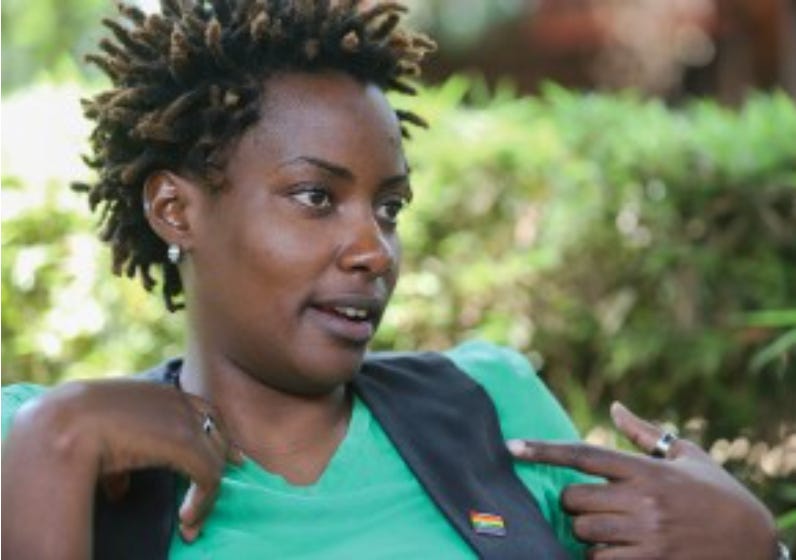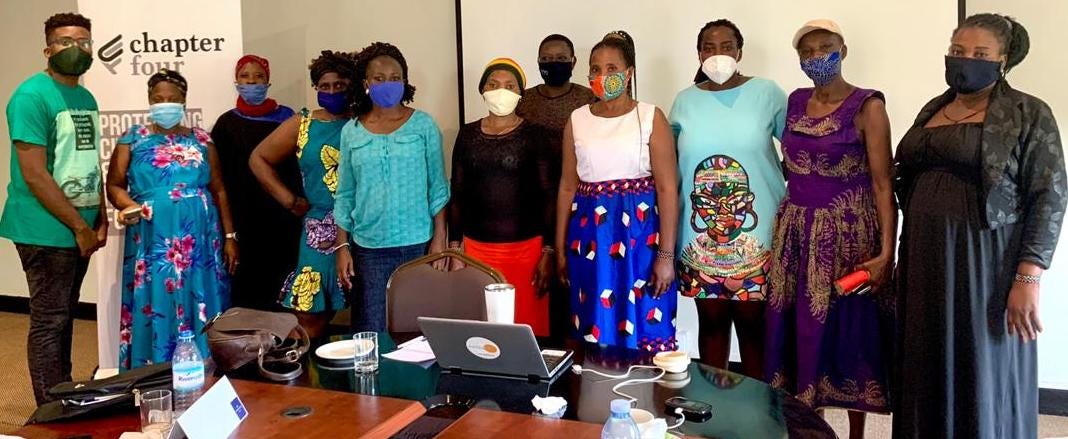Like a Mother Hen
Some fragmented thoughts on Uganda's devastating new anti-LGBTQ law, the bravery of the moms of PFLAG-Uganda, and the work of one remarkable queer activist
Wednesday, April 19
Grand Rapids, Mich.
I am thinking this week, gentle reader, about motherly love.
A word of warning: This is not an easy read, especially if you are a member of the LGBTQ+ community who has experienced trauma because of your identity.
A couple of weeks, I read an open letter to the president of Uganda from a group of mothers. They were writing to protest a sweeping, anti-LGBTQ+ law that the Ugandan parliament recently passed, which now sits on President Yoweri Museveni’s desk, awaiting his signature. The law proposes some of the world’s harshest penalties for homosexual activity, ranging from a 10-year prison sentence for “attempted” same-sex conduct (what does that even mean?) to the death penalty for same-sex activity with a disabled person. It would also criminalize providing housing to any sexually active LGBTQ+ person (up to 10 years in prison) as well as require Ugandans to report to the police anyone they suspect of homosexual activity (a fine or up to six months imprisonment).
In the letter, which was published in The Monitor, Uganda’s largest daily newspaper, the mothers wrote: “We have watched our children be vilified, disparaged, and publicly castigated—that is, verbally threatened, physically targeted, and abused for who they are and for whom they love, based on unsubstantiated, false, and unchecked allegations, such as the ‘recruitment of children and erosion of Ugandan culture’, all in an attempt to misrepresent facts and manipulate the fears of fellow Ugandans. No parent should ever be put in such a position as we find ourselves today least of all by a legislative body elected by Ugandans to represent and pass laws that protect all Ugandans. We have always loved our children, and this did not change when we learned that they are Lesbian, Gay, Bisexual, Transgender and Intersex respectively.”
(You can read the whole letter here.)
The letter also contained a remarkable moment of confession: “We tried all means necessary, including prayer, recrimination, and different forms of punishments to force them onto the path that we selfishly thought would be right for them, and us,” the moms wrote. “In the process of doing so, we were inadvertently threatening to take away the only refuge that a child has: a safe and loving home, free from violence, unrealistic expectations, and hate.” With their real names appended, they called on President Museveni to veto the legislation: “As mothers, we can no longer stand on the sidelines and watch as our children continue to be bashed and threatened in such a dangerous and deliberate manner.”
In 2015, I traveled to Uganda on a fellowship funded by the International Reporting Project to explore the spiritual lives of LGBTQ+ Ugandans. One of the people I met there was the queer activist Clare Byarugaba, whom I profiled for The Christian Century. We have stayed in touch over the years since my visit, and when I read the letter, I immediately thought that Clare might have helped facilitate this letter. I was right: All the mothers belong to PFLAG-Uganda, which Clare founded in 2019 under the umbrella of Chapter Four, the civil-liberties organization for which she works.
“It’s incredibly brave of them,” she said when we spoke by Zoom earlier this week. “Some have had a bit of eventualities because of the letter. But everyone is alive.”
The letter represents some of the most remarkable public fruit of the investments Clare has made in PFLAG-Uganda over the past several years. When the support group for parents began four years ago, “they couldn’t even meet each others’ eyes. There was a lot of tension,” she told me. “The very first meetings were really to help them understand what it means to be a parent of an LGBT child: what they have been told by the Church, what they have been told by society, what they have been told by their own children. We were just trying to unpack what it all means.”
None of the parents was affirming at the time, but their very presence suggested an openness to trying to support their children. “But they were using derogatory language—the same language they know from society—for their children,” Clare said. “They said, ‘Abasiyazi,’ which is what we are called in Uganda. It literally means ‘eaters of rubbish.’ In the meeting, I felt myself tensing every time they said it. But I understood that it was why they were there—to understand their impact.”
Clare brought in different facilitators and educators: a gay man who shared his story, so that the parents could ask awkward questions that they would never dare ask their own children; a specialist in intersex issues; a trans person; therapists; and Christopher Senyonjo, a retired bishop in the Church of Uganda who is one of the few clergy in the country to advocate loudly for LGBTQ+ equality. “To see a bishop with a collar, who has suffered for standing with the community, gave them a different perception,” Clare said. Every single member of the group is religious—some Catholic, some Muslim, some evangelical. “This was the first time they had seen such a person of faith stand up and tell them that God loves their children.”
After the meeting, one woman went up to Clare and said that she was “so happy at least one man of God will be able to say prayers for my child when they pass away—and it won’t be casting them to hell. It will be affirming their life.” “It was very powerful for me to hear her say that,” Clare told me. “With that one session, her fear that her child was going to hell or that her child would not be buried in dignity was reversed. They heard that God indeed loves their LGBT children.”
Just ten parents have consistently attended the monthly sessions. (They did take a pandemic-induced pause.) All but one is a mother, but the lone father passed away in 2022. “I’d always envisioned that he would be our conduit to encourage other fathers,” Clare said. Fatherly support is especially challenging in a culture that is deeply patriarchal. “In our culture, the burden of raising a child who is seen to have gone off the path usually falls on the mother,” she explained. “The father wants only to be associated with children who are successful, who conform to whatever standards they have been put to. If a child is not well-behaved, he usually tells the mother: This is your child. This is your problem. I didn’t give birth to this child. You gave birth to this child.”
Clare designs the gatherings to be warm and hospitable. For security reasons, she usually books a conference room at one of Kampala’s posher hotels. She also feeds them well: usually, matoke, the mashed and pounded banana that is a staple of the Ugandan kitchen, as well as peanut sauce, peas, and then fish, chicken, or goat, which most of them can’t afford on a regular basis. This also means that the moms, who all live in the semi-rural outskirts of the city, get to see their half-day gatherings as a special occasion. “They always take pictures,” Clare said with a laugh, “as if we were in Dubai.”
Two years ago, a couple of the mothers decided that they were ready to publicly advocate for their children. They and Clare spoke to the BBC for The Comb podcast.
But it wasn’t until the current anti-LGBTQ law was proposed that they felt compelled to more local activism. The headlines in Uganda were filled with stories about the law. “Every single day, there was so much anti-gay rhetoric,” Clare said. “They came to me expressing their concerns. When they asked, What can we do? I said, Thank you for asking that question!”
She suggested that they could write a letter to Parliament, but the bill passed, on March 21, before they could get organized. So Clare suggested that the letter instead be addressed to President Museveni. She helped them draft it in Luganda and translate it into English, which none of them speak. A week after the parliamentary vote, the Monitor published the letter, with the mothers’ real names.
In the weeks since, the women have felt the consequences of their bold allyship. When one woman’s relatives saw her name in the newspaper, they began berating her and shaming her for this public humiliation of the family. She was forced to leave her home to stay with relatives in another place. Two of the mothers have had to send their children to stay elsewhere for security reasons, while others have been unable to work. “These are not parents who live in gated communities and have security guards,” Clare said. “These are parents who struggle to support their children, who live paycheck to paycheck.”
The mothers are under no illusions that the President will suddenly soften his hardline anti-LGBTQ stance. About two weeks after Parliament passed the law, Uganda hosted a two-day gathering on “family rights and sovereignty.” The event was funded in part by Family Watch International, a right-wing U.S. organization that is often described as evangelical Christian but that was co-founded and is led by Sharon Slater, a member of the Church of Jesus Christ of Latter-day Saints.
After the gathering, Museveni welcomed a host of conference attendees, including Slater, to State House Entebbe, his official residence. While he has not said whether he will sign the law, he was not shy about his opinions during that meeting. “Africa should provide the lead to save the world from this degeneration and decadence, which is really very dangerous for humanity,” he said. “Homosexuality is reversible and curable... It should not be preserved or propagated. It should be confined.”
When I asked Clare whether there was any chance Museveni would veto the law, she said, “You know me. I am endlessly optimistic. And my endless optimism is that members of Parliament and the President will listen to the cries of these parents who are terrified about the future of their children.” She expressed joy at how far the moms have come: “They’ve worked so hard, against so many odds, to be the allies that their children need. It has been a very lonely work.”
Frankly, I am baffled by Clare’s endless optimism. Her ability to find the best even in her family as well as her unflagging wit humble me. “My mom and I are fairly okay,” she said. “She doesn’t ask me for a husband anymore! The other day, she did intimate that she wished I had a normal job. I said, Sorry I can’t be a bank teller. It’s too late. Sometimes I wish I was. But it’s too late.”
Clare carries a particular grief that, in the wake of the law’s proposal and passage, not a single one of her seven brothers has reached out to her. “None has said, If anything happens to you, I will have your back. None has said, We are very proud of your fight. They see me in the media! None has asked me, What do you need? How can I support you?” she told me. “There hasn’t been that kind of solidarity that each and every one of us needs at this time.”
In February, Clare completed her certification as a mindfulness-meditation instructor. “It’s my heart’s work,” she said. She has found strength and solace in offering virtual meditation sessions to other queer people. For two hours, they can be in relative safety. “We talk about the stuff they are dealing with, and then we gather in meditation to create a space for all that, and in some way, we heal together—or at least we unburden.”
Clare was reared in a devoutly Christian home, so I asked her how she is feeling about God these days. She paused for a long moment. “I’m not mad at God,” she said. “But my belief system has evolved enough that I will not sit and pray that God touches the heart of Museveni, because that’s not a practical request.” The fight against the law “brought back all the stuff—all the disappointment, all the feeling that religion continues to be used to persecute and oppress us.”
She reminded me that she left church after the Sunday when her pastor passed around a petition supporting a previous anti-LGBTQ law. “They are using the Lord’s name in a way that it shouldn’t be used,” she said. “It should be different. Places of worship should be safe abodes. I’ve always longed for the Church to be safe for us. All of us.”
If you feel led to support Clare Byarugaba’s work, she welcomes the solidarity. Any contributed funds will go toward her personal security as well as toward security and support for some of the PFLAG mothers. PFLAG-Uganda is not a recognized charity in the U.S., so please note that your gift will not be tax-deductible. Clare has asked that I collect any contributions and send them to her directly. You can Venmo me (@byjeffchu) and I will provide you with documentation to show that the funds have been transferred to Clare.
I did an Instagram AMA this week, and you can find all the responses here. I got some weird questions—I have no idea why anyone would want to know whether I enjoy household chores—but I always commit to answering any questions that come in.
One person asked what is giving me joy and hope this week, and all I could muster was this picture of the tulips I cut from the yard over the weekend. Even as they fade, I still think they’re glorious—and there’s a particular beauty to them right now.
Otherwise, my heart is heavy, so I think I’m just going to leave it at that for this week. If you’d like to share a word of encouragement for Clare, for the queer folks she works with, and for the moms of PFLAG-Uganda, feel free to leave a comment.
As ever, I’m so glad we can stumble through all this together—how can we make it through this aching world except together?—and I’ll try to write again soon.
Yours,
Jeff







An update: Clare wrote last night to share her gratitude and also to report that President Museveni declined to sign the legislation as written and sent it back to Parliament "for improvement."
Thank you for sharing this Jeff, and thank you Clare for entrusting us with a bit of your story. Jeff, I don’t know if we’ve ever interacted directly before, but I’ve wanted to tell you that your book was the final push towards becoming fully affirming in my theology. I had been moving in that direction for a decade, and reading your book back in 2021 was the final piece falling into place for me. Since then I’ve been involved in an affirming church community, and many times have been overwhelmed with gratitude for it. I saw on your stories yesterday what you said about writing that book (and going on the book tour) being incredibly challenging, and I want to thank you for doing it because it has had a deep impact on me, and by extension as my theology has shifted, on those around me.